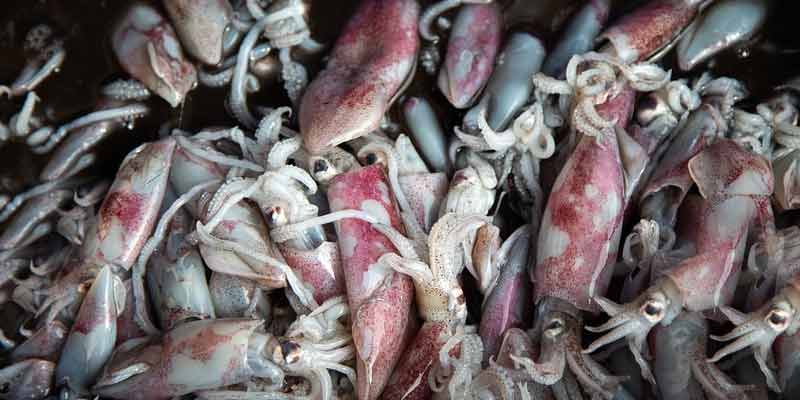Last Updated on May 4, 2023
Squid, or calamari, is a popular seafood choice around the world, prized for its tender and delicious meat. But as with any perishable food, it’s important to know when it’s no longer safe to eat. This article will help you identify the signs of spoiled squid, discuss proper storage methods for different types of calamari, and answer common questions about frozen squid.
Signs of Spoiled Squid
There are several indicators that can help you determine if your squid is past its prime. When evaluating the freshness of squid, pay close attention to the following:
Appearance
A fresh, uncooked squid should have a translucent and slightly iridescent appearance. Spoiled squid may become dull, opaque, or discolored. If you notice any mold or slime, it’s a clear sign that the squid has gone bad and should not be consumed.
Texture
Fresh squid should feel firm to the touch, with a slightly slick surface. If the squid feels excessively slimy, sticky, or mushy, it’s likely spoiled and should be discarded.
Smell
A strong, fishy odor is a telltale sign of spoiled squid. Fresh squid should have a mild, slightly sweet scent, similar to that of other fresh seafood. If your squid smells sour, rancid, or ammoniated, it’s time to toss it out.
Taste
If you’ve accidentally cooked spoiled squid, you may notice an off taste. However, tasting the squid to determine its freshness is not recommended, as spoiled seafood can cause foodborne illness. Instead, rely on the appearance, texture, and smell to determine if your squid is still good to eat.
Proper Storage Conditions
To maintain the freshness of your squid, it’s crucial to store it properly. Depending on the type of calamari you have, different storage methods are necessary.
Fresh Calamari Storage
For fresh squid, store it in the refrigerator as soon as possible after purchase. Wrap the squid in plastic wrap or place it in an airtight container, and store it in the coldest part of your fridge, ideally at temperatures between 32°F and 40°F (0°C and 4°C). Fresh squid should be consumed within one to two days of purchase.
Boiled or Fried Calamari Storage
Cooked calamari should be stored in an airtight container in the refrigerator. It will typically last for two to three days when stored at the proper temperature (32°F to 40°F or 0°C to 4°C). If you don’t plan to eat your cooked calamari within this time frame, consider freezing it for later use.
Dried Calamari Storage
Dried calamari should be stored in a cool, dry place away from direct sunlight. Keep it in an airtight container or a resealable plastic bag to prevent moisture from affecting the texture. Dried squid can last for several months when stored properly, but always check for signs of spoilage before consuming.
Smoked Calamari Storage
Smoked calamari should be wrapped in wax or parchment paper and stored in a cool, dry place away from direct sunlight. It can also be stored in the refrigerator for added shelf life. Smoked squid can last for a couple of weeks when stored properly.
Pickled Calamari Storage
Pickled calamari should be stored in a sealed container in the refrigerator. The acidic nature of the pickling liquid helps to preserve the squid, and it can last for several weeks when stored properly. Be sure to check for any signs of spoilage before consuming.
Handling Frozen Squid
Frozen squid is a convenient option for those who want to enjoy calamari without worrying about spoilage. However, there are still some considerations to keep in mind when dealing with frozen squid.
Should Frozen Squid Smell Fishy?
It’s normal for frozen squid to have a mild, fishy odor when thawed. However, if the smell is overpowering or unpleasant, it may be a sign that the squid has spoiled or was not handled properly during the freezing process. Trust your nose and discard any squid that smells off.
How Long Does Raw Squid Last in the Freezer?
When properly stored in an airtight container or freezer-safe bag, raw squid can last in the freezer for up to three months. After this time, the quality of the squid may begin to decline, but it should still be safe to eat if it was frozen at peak freshness.
What Are the White Spots on Frozen Squid?
White spots on frozen squid are often the result of freezer burn, which occurs when the surface of the squid dries out due to air exposure. Freezer burn does not necessarily mean the squid is spoiled, but it can affect the taste and texture of the calamari. To prevent freezer burn, make sure to store the squid in an airtight container or a heavy-duty freezer bag, and remove as much air as possible before sealing.
Does Frozen Squid Expire?
While frozen squid does not technically “expire,” its quality will degrade over time. As mentioned earlier, properly stored raw squid can last up to three months in the freezer. After that, the texture and taste may not be as desirable, but the squid should still be safe to eat if it was frozen at peak freshness. Always check for signs of spoilage, such as a strong odor or slimy texture, before consuming frozen squid.
Is it OK to Eat Frozen Squid?
Yes, it is safe to eat frozen squid as long as it has been stored properly and shows no signs of spoilage. Just make sure to thaw the squid safely, either in the refrigerator or by submerging it in cold water. Never thaw frozen seafood at room temperature, as this can encourage bacterial growth.
Checking for Freshness
When selecting squid, whether fresh or frozen, it’s important to know how to identify high-quality seafood. Here are some tips for checking the freshness of squid and handling it once you’ve brought it home:
How Do You Know If Squid is Fresh?
A fresh squid should have a translucent, slightly iridescent appearance, and its surface should be slightly slick but not slimy. The squid should also have a mild, slightly sweet scent, similar to that of other fresh seafood. If the squid has any off-putting odors, appears dull or discolored, or feels excessively slimy, it may not be fresh and should be avoided.
How Do You Clean a Squid After It’s Thawed?
After thawing frozen squid, you may need to clean it before cooking. To do this, first remove the head and tentacles by gently pulling them away from the body. Next, remove the beak, which is located in the center of the tentacles, and discard it. Then, use your fingers or a small knife to remove the squid’s internal organs and ink sac. Rinse the squid under cold running water, both inside and out, to remove any remaining debris. Finally, remove the thin, clear cartilage (quill) from inside the body and peel away the outer skin.
How Do You Divide Frozen Squid?
If you’ve purchased a large quantity of frozen squid and only need a portion for your meal, you can divide the squid while it’s still frozen. Using a sharp knife, carefully cut through the squid, separating it into individual pieces or smaller portions. Be sure to handle the knife carefully, as cutting through frozen squid can be challenging. Once you’ve divided the squid, wrap the portions you’re not using in plastic wrap or place them in airtight containers before returning them to the freezer.
What to Do If You Suspect Spoiled Squid
If you suspect your squid may be spoiled, it’s important to take the necessary precautions to ensure your safety and prevent future spoilage.
Disposing of Spoiled Squid
When discarding spoiled squid, wrap it tightly in plastic wrap or a plastic bag to contain the smell, and dispose of it in an outdoor trash can. Be sure to wash your hands thoroughly with soap and water after handling the spoiled seafood to prevent the spread of bacteria.
Preventing Future Spoilage
To prevent future spoilage, always store your squid properly, whether fresh, cooked, or frozen. Keep it at the appropriate temperature and in the correct storage containers. Additionally, try to consume squid within the recommended time frames to ensure optimal quality and safety.
Conclusion: Staying Safe and Enjoying Your Squid
Knowing the signs of spoiled squid and understanding proper storage methods are crucial to enjoying calamari without risk. By following the guidelines in this article, you can confidently select fresh squid and keep it at its best until you’re ready to cook and savor this delicious seafood.
FAQs About Squid Storage and Spoilage
Does squid go bad quickly?
Squid, like other seafood, can spoil quickly if not stored properly. Fresh squid should be consumed within one to two days of purchase, while cooked calamari should be eaten within two to three days.
What happens if you eat spoiled squid?
Eating spoiled squid can cause foodborne illnesses, such as food poisoning, due to the presence of harmful bacteria. Symptoms may include nausea, vomiting, diarrhea, and stomach cramps.
Can you refreeze thawed squid?
It is generally not recommended to refreeze thawed squid, as this can affect the texture and quality. However, if the squid was thawed safely in the refrigerator and has not been exposed to room temperature for an extended period, it may be safe to refreeze.
How can I tell if my frozen squid is still good to eat?
Check the appearance, smell, and texture of the thawed squid. If it has a mild, fishy odor, a slightly slick surface, and a firm texture, it should still be safe to eat. Discard any squid that smells off, appears discolored, or feels slimy.
Can you cook squid directly from frozen?
While it’s best to thaw frozen squid before cooking to ensure even cooking and optimal texture, it is possible to cook squid directly from frozen in some cases, such as when deep-frying or grilling. However, cooking times may need to be adjusted to account for the frozen state.
Is it safe to eat raw squid?
Consuming raw squid, like any raw seafood, carries a risk of foodborne illness. If you choose to eat raw squid, make sure it has been properly stored and handled, and consume it as soon as possible after purchase. It’s also recommended to buy squid from reputable sources that adhere to strict food safety standards.
Can you freeze cooked calamari?
Yes, cooked calamari can be frozen for later use. Allow it to cool completely before transferring it to an airtight container or heavy-duty freezer bag. Cooked calamari can be stored in the freezer for up to three months.
How do you reheat frozen cooked calamari?
To reheat frozen cooked calamari, first thaw it in the refrigerator. Once thawed, you can reheat it in the oven at 350°F (175°C) for about 10 minutes, or until heated through. You can also reheat calamari on the stovetop in a skillet over medium heat, stirring occasionally until warmed. Avoid using a microwave, as this can result in a rubbery texture.
About The Author

Mindy Vu is a part time shoe model and professional mum. She loves to cook and has been proclaimed the best cook in the world by her friends and family. She adores her pet dog Twinkie, and is happily married to her books.

